Driveway Materials
Driveway
There are so many different options when it comes to renovating your driveway. You need to think about design, shape, and most importantly material. To start, you want to evaluate the different types of materials and weigh the pros and cons. This is a time-consuming process but will pay off in the end so you know your investment will match your vision and your budget.
Concrete
Concrete serves many useful purposes in the construction industry, and now you can use it for your residential home improvements. A driveway needs to be built out of strong material so you can store that family-sized RV in addition to your cars. By renovating your driveway with concrete, you get all the perks that come with it:
Pros:
- Easy upkeep and maintenance
- Durable; lasts 25-30 years
- Offers many design options
- Evironmentally friendly
Cons:
- High upfront costs
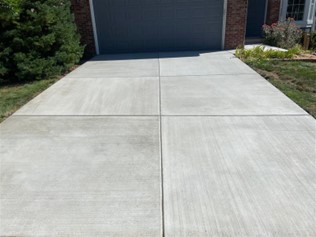
Asphalt
Asphalt is the second most popular material residential places use for their driveways. With its black surface, it absorbs and holds heat more efficiently. So if you live in a cold climate and have a north-facing driveway, asphalt will speed up the snow-melting process.
Pros:
- Inexpensive
- Easy repair
- Less vulnerable to cracking
- less damage by ice/salt
Cons:
- Requires sealing regularly
- Up to a full year of curing time
- Only 1 design
- Lasts 15-20 years
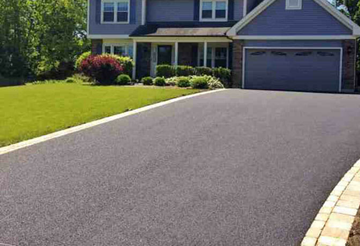
Exposed Aggregate
Exposed Aggregate is a great material to use for driveways as it can withstand heavy wear and tear and resist cracking. Exposed aggregate is a safer material to use, there is less chance of slipping due to the exposed stone. If you have a steep driveway and need more traction, especially during winter, try an exposed aggregate driveway.
Pros:
- Adds traction
- Durable
- Easy maintenance
- No weeds
Cons:
- Cannot install yourself
- Patching repairs is not as simple as patching concrete
- Upkeep: dirt is more easily caught between the stones
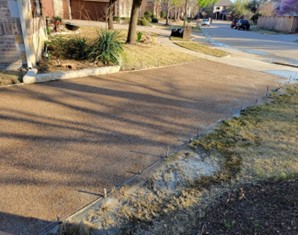
Pavers
Pavers material is for homeowners who want to add more pizazz to their driveway and stand out from their neighbors. This offers a modern concrete driveway that will compliment your home’s aesthetic very nicely.
Pros:
- Long lasting
- low maintenance
Cons:
- Expensive
- not great for colder/snowy climates
- Weeds can grow through cracks
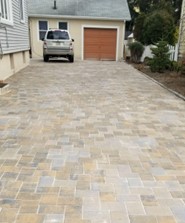
Brick
A Brick driveway will bring your entire home’s look together. You can choose between many different driveway shapes and brick colors so you can match your style to your personality more easily.
Pros:
- Durable in all weather conditions
- Classic, high-end design
- Easy single brick replacement
Cons:
- Labor intensive
- Brick's shift/loosen
- Fewer design options than pavers
- Weeds
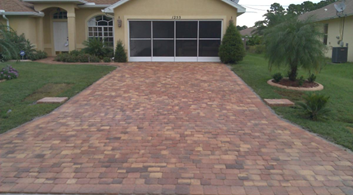
After looking at the pros and cons of each of these driveway material options, concrete proves to be the best material for your investment. Using professional concrete contractors will ensure the job gets done to your highest standards. With this long-lasting material, it’s hard to turn down such a great investment for your next driveway. There are so many design options when you use concrete so your driveway can match your home’s aesthetic. It’s easier to renovate a driveway design than it is to your whole house!
Endless Concrete Design Options for your Driveway
As we can see there are many materials to choose from for your new driveway. But if you are still struggling in figuring out how your driveway’s design will match the rest of your house, check out the different color and style options concrete offers. You can mix multiple colors or even use color on your stamped design. The options are endless, and there are even more concrete driveway ideas than what’s listed below!
Stamped
If you want decorative options that are not possible with other paving materials, a stamped concrete driveway is the way to go. There are many cons to using brick and flagstone material, stamped concrete is a great alternative to getting those styles without the maintenance hassle.
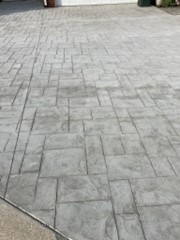
Colored
You are not limited to just one color, try mixing multiple colors to create a one-of-a-kind custom color. Colored driveways are a simple way to add more style so you can match the color to your house’s color scheme. One of the pros of asphalt includes its ability to absorb heat for snow melt. With coloring, you can use dark colors to absorb more heat and reap the snow melt benefit, while still being able to use concrete material. In addition, you can use light colors to reflect heat if you live in a warmer climate.
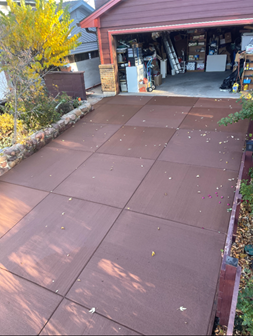
Borders
With a longer driveway, adding borders will finish the look. Concrete borders add sleek and modernized appeal to your driveway and home.
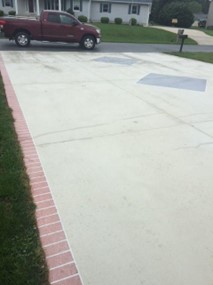
Sealing
Concrete requires timely maintenance to avoid deterioration, cracks, and staining. To prevent damaging your concrete, apply a sealer! They serve as a barrier between outside factors like harsh temperatures and weather including freezing and thawing, snow, and ice. Concrete sealing should be maintained at a minimum of every three years to work properly. It is also very common for homeowners to use sealing over their colored concrete to prevent fading, making it look more vibrant and shiny.
Sealing should be factored into your budget if you want your concrete to last more than 15 years. Frequent sealing is cheaper compared to driveway reconstruction. Although you can apply the sealer yourself, it is recommended to use a professional contractor to ensure the right sealer is used.
Why Concrete Cracks
As a homeowner, you want to make sure your next concrete driveway will last to its full potential. The process of making concrete is very tedious and needs to be done correctly to ensure cracking won’t happen. Concrete driveway contractors need to be highly sensitive during the three steps of making concrete which are mixing, pouring, and curing. Thus, if something is messed up during one of those stages the result is early on cracking. Homeowners choose concrete for its durability and longevity, so attention to detail is important.
With 30 years of experience, Sam The Concrete Man has pinpointed the number one reason for cracking to be caused by excess water in the concrete mix. More water makes concrete easier to set, but it messes with the strength of the final product. Shrinkage is a common factor that occurs in hot climates where excess water evaporates thus, the wetter the concrete the greater the shrinkage. When shrinkage becomes greater than the strength of the concrete what results is cracking. Here you can read a few more reasons behind why concrete cracks.
How to Avoid Cracking
When concrete is installed correctly, as a homeowner you will for sure know that you won’t need to worry about cracking. Always make sure the contractors you hire follow well-established guidelines about concrete placement. Cracks will not happen by accident. Below are four ways to help prevent cracking:
- Good Subgrade: The subgrade is the layer that needs to be sound to create a sturdy foundation. Depending on the soil, if it is clean and compactable you won’t need any extra layers. However, adding a sub-base on top is a good idea to create thickness so the slab can withstand more load. The third layer you can choose to add is a base course. The base makes it easier to get the correct grade and flatness.
- Modify the Concrete Mix: As discussed above, you want to use a low water-to-cement ratio so the concrete is not too wet and shrinkage does not occur. Using concrete admixtures can control cracking as well. These are natural or manufactured chemicals to add during the mixing stage to enhance properties like durability, workability, or early and final strength. Lastly, you can use fiber reinforcements to increase its structural integrity.
- Add Joints: Control joints are planned cracks that are caused by temperature changes or drying shrinkage. If cracking does occur, joints allow for movements that might occur in certain areas of your driveway so cracking is in a straight line rather than randomly. However, placing these should be under a professional’s opinion so the joints can properly do their job and are helpful.
- Cure the Concrete Properly: Curing is an important role in developing the strength and durability of concrete. During the first week, the concrete is poured, it’s crucial to keep up maintain correct dampness and temperature levels for proper curing.
How Long Until You Can Use Your New Driveway
Curing is the last stage in the concrete process, one that you do not want to skip. The period concrete takes to cure is about 28 days. By this time, your driveway is at full strength and is ready for full usage. Always keep in mind that drying times can vary based on differences in weather, concrete mix, and finishing techniques. Below are curing timeframes:
- 24-48 Hours: Forms can be removed and people can walk freely on the surface
- 7 Days (partial curing): Passenger vehicles and equipment
- 28 Days: Concrete is fully cured
During this process, you might notice discoloration and blotchy patches on your driveway. Don’t worry, these are natural effects of curing and go away once the curing process is completed. There are a few reasons why we stress the importance of waiting the full 28 days before using your driveway for heavy machinery/vehicles. Curing retains moisture in the slab so the concrete continues to gain strength. The process delays drying shrinkage until the concrete can resist shrinkage and cracking. Lastly, this helps improve durability, strength, water tightness, and wear resistance so your driveway can last longer.
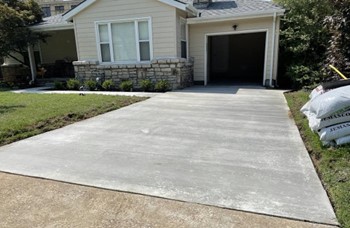
Average Cost of a New Concrete Driveway
There are many factors to consider that affect the price of concrete. It depends on where you are located throughout the US for instance, southern states will experience lower per-square-foot prices. In addition, if the concrete is more scarce in certain regions the price will increase. For inexpensive driveway ideas, there are many options you can go with. We have gathered average prices per square foot for each design option across the US so you get the most accurate price:
- Sealer: $1.20-$1.75
- Standard finish: No decorative, finishes or colors. ($10-$12)
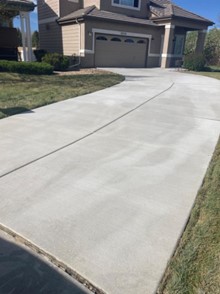
- Simple design: Includes one coloring or decorative design. ($12-$14)
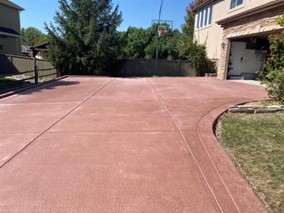
- Custom design: Includes two or three colors or a border. ($14+)
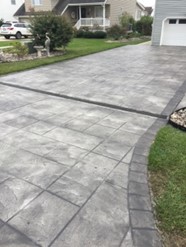
The final price is based on the square footage of the driveway, which can be calculated by taking the length (ft) multiplied by the width (ft). Concrete driveway contractors are equipped to take the most precise measurements to ensure accurate pricing of your new driveway. They use chalk for irregular shapes, measuring tape, and sometimes string. The average size of a driveway in the US is 20’ x 24’ resulting in an average concrete driveway cost of $5,280. This final price is for a standard finish driveway.
Concrete PSI
Concrete psi (pounds per square inch) is the main price factor as it measures the compressive strength of concrete. The higher the concrete psi, the more expensive it will be per cubic yard. Concrete psi for a driveway ranges from 3500-4000 psi. Based on current cost factors, here is the price structure of concrete psi per cubic yard:
- 3,000psi: $180
- 3,500psi: $200
- 4,000psi: $220
- 4,500psi: $240
Why Sam The Concrete Man Can Help With Your New Concrete Driveway
Sam The Concrete Man has been helping their local community with concrete projects for the past 30 years. With a trusted team, we will be with you during your next project from the estimate through the end. Having professional contractors is a must for any of your concrete renovations, so having a knowledgeable team is very important. We offer unlimited design options and a helping hand if you need more information to make a decision. Sam The Concrete Man is here to support you during your concrete driveway journey.
We come prepared for your estimate with different informational materials and even print proposals on-site to give you something to think about right away. With our excellent customer service and quality concrete, we invite you to schedule a quick free on-site estimate today in a location near you!
Home | Locations | Gallery | Commercial | Residential | Privacy Policy
Copyright 2020 Sam The Concrete Man. All Rights Reserved.
Powered by Epoch

